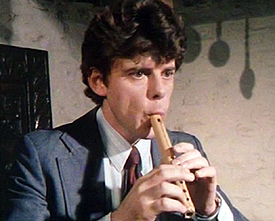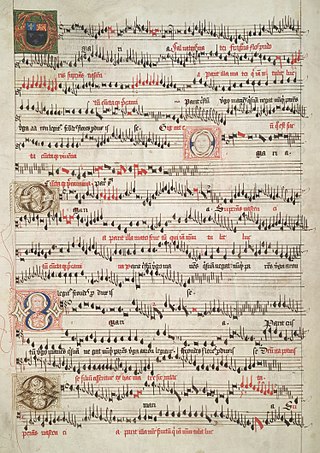Related Research Articles

David John Munrow was a British musician and early music historian.

The Eton Choirbook is a richly illuminated manuscript collection of English sacred music composed during the late 15th century. It was one of very few collections of Latin liturgical music to survive the Reformation, and hence is an important source. It originally contained music by 24 different composers; however, many of the pieces are damaged or incomplete. It is one of three large choirbooks surviving from early-Tudor England.

Juan del Encina was a composer, poet, priest, and playwright, often credited as the joint-father of Spanish drama, alongside Gil Vicente. His birth name was Juan de Fermoselle. He spelled his name Enzina, but this is not a significant difference; it is two spellings of the same sound, in a time when "correct spelling" as we know it barely existed.
An early music revival is a renewed interest in music from ancient history or prehistory. The general discussion of how to perform music from ancient or earlier times did not become an important subject of interest until the 19th century, when Europeans began looking to ancient culture generally, and musicians began to discover the musical riches from earlier centuries. The idea of performing early music more "authentically", with a sense of incorporating historically accurate performance practice, was more completely established in the 20th century, creating a modern early music revival that continues today.

James Tyler was a 20th-century American lutenist, banjoist, guitarist, composer, musicologist and author, who helped pioneer an early music revival with more than 60 recordings.
John Stewart Beckett was an Irish musician, composer and conductor; cousin of the famous writer and playwright Samuel Beckett.
Don LeRoy Smithers is an American music historian and performer on natural trumpet and cornetto. He is a pioneer for the revival of the authentic, uncompromised natural trumpet.
Maurice Steger is a Swiss recorder player and conductor, mostly in Baroque music.

The Cancionero de Palacio, or Cancionero Musical de Palacio (CMP), also known as Cancionero de Barbieri, is a Spanish manuscript of Renaissance music. The works in it were compiled during a time span of around 40 years, from the mid-1470s until the beginning of the 16th century, approximately coinciding with the reign of the Catholic Monarchs.

Early music of Britain and Ireland, from the earliest recorded times until the beginnings of the Baroque in the 17th century, was a diverse and rich culture, including sacred and secular music and ranging from the popular to the elite. Each of the major nations of England, Ireland, Scotland, and Wales retained unique forms of music and of instrumentation, but British music was highly influenced by continental developments, while British composers made an important contribution to many of the major movements in early music in Europe, including the polyphony of the Ars Nova and laid some of the foundations of later national and international classical music. Musicians from the British Isles also developed some distinctive forms of music, including Celtic chant, the Contenance Angloise, the rota, polyphonic votive antiphons, and the carol in the medieval era and English madrigals, lute ayres, and masques in the Renaissance era, which would lead to the development of English language opera at the height of the Baroque in the 18th century.
Frank Corcoran is an Irish composer. His output includes chamber, symphonic, choral and electro-acoustic music, through which he often explores Irish mythology and history.
Grayston Burgess (Cheriton, Kent 7 April 1932 – 6 March 2019 was an English countertenor and conductor.
John Francis Larchet was an Irish composer and teacher. He studied at Trinity College Dublin, also at the Royal Irish Academy of Music (RIAM) with Michele Esposito. Larchet was music director at the Abbey Theatre from 1908 to 1935 and was therefore responsible for the stage music accompanying many of the pivotal plays of the Irish Literary Renaissance, in particular those of William Butler Yeats, and also had his ballet Bluebeard performed there, including the dancer Ninette de Valois. Although a prolific composer and arranger, his main contribution to Irish music was as a teacher: He taught harmony and counterpoint at the Royal Irish Academy of Music between 1920 and 1955 and was Professor of Music at University College Dublin between 1921 and 1958. Among his pupils were Frank Ll. Harrison (1905–1987), Elizabeth Maconchy (1907-1994), Michael Bowles (1909–1998), Frederick May (1911–1985), Walter Beckett (1914–1996), Joan Trimble (1915–2000), Brian Boydell (1917–2000), T.C. Kelly (1917–1985), Havelock Nelson (1917–1996), Gerard Victory (1921–1995), and Seóirse Bodley (1933–2023).
Acourt was a French composer who flourished sometime during the first half of the 15th century. Only two chansons by the composer survive from a 15th-century manuscript, MS. Canon. Misc. 213, housed at the Bodleian Library. His best known work is the chanson Je demande ma bienvenue which was first published in John Stainer's Early Bodleian music: Dufay and his contemporaries. Musicologist Elizabeth Randell Upton provides a thorough analysis of the chanson in Music and Performance in the Later Middle Ages. John S. Beckett and Michael Morrow's ensemble Musica Reservata recorded Je demande ma bienvenue on their LP Music from the Hundred Years War. More recently the chanson has been included in concerts by the early music group Armonia Nova.
Profeti della Quinta is a male vocal ensemble, specializing in the music of the Renaissance and Baroque periods. Founded in the Galilee region of Israel by Elam Rotem, the ensemble is currently based in Basel, Switzerland, where its members undertook advanced studies at the Schola Cantorum Basiliensis. The core of the ensemble includes countertenor, tenor and bass singers, who perform either a-cappella or together with period instruments such as theorbo and harpsichord.
New London Consort was a London-based Renaissance and Baroque music ensemble, which performed in most of Europe and various other parts of the world. Founded and directed by Philip Pickett, most of its repertoire was recorded and broadcast by BBC and regularly appeared at major venues and festivals. This repertoire included unpublished works and new interpretations of familiar ones, sometimes controversial. The group has been inactive since its director's conviction as a sex offender in 2015.

David Fallows is an English musicologist specializing in music of the late Middle Ages and early Renaissance, as well as the performance practice of music. He is a leader in fifteenth-century music studies, particularly secular song, Guillaume Dufay, and Josquin des Prez, both the subject of landmark biographies Fallows has written.
St. George's Canzona is a British musical ensemble.
Michael Morrow was an Irish artist, ornithologist, musician and musicologist who, together with John Beckett, founded the British early music group Musica Reservata in London during the late 1950s. He directed the group, which became famous for its ground-breaking and vigorous approach to performing Medieval and early Renaissance music, until it was disbanded in the 1980s.
References
- ↑ Charles Gannon, John S. Beckett — The Man and the Music, Dublin: 2016, The Lilliput Press, ISBN 9781843516651, pp. 89-94.
- ↑ John S. Beckett, p.95.
- ↑ John S. Beckett, pp. 106-7.
- ↑ David Fallows: Musica Reservata, The New Grove Dictionary of Music and Musicians (1980), Vol. 12, p. 827; John S. Beckett, p. 127.
- ↑ Interview with Michael Morrow, Arts Guardian, 23 June 1975, p.8; John S. Beckett, p. 127.
- ↑ Musica Reservata, Early Music, Vol. 4, No. 4, 4 October 1976, p. 515; John S. Beckett, p. 127.
- ↑ John S. Beckett, pp. 126-7, 508.
- ↑ John S. Beckett, pp. 145-6, 509.
- ↑ John S. Beckett, pp. 164-5.
- ↑ John S. Beckett, pp. 176-9, 510.
- ↑ John S. Beckett, Appendix E, Musica Reservata Concerts, pp. 508-517; Appendix B, Discography, pp. 458-62; Appendix D, BBC Radio and Television Broadcasts, pp. 481-507.
- ↑ John S. Beckett, pp. 513-7.
- ↑ John S. Beckett, p. 245.
- ↑ This record won an Edison Award in 1969. See John S. Beckett, p. 193.
- ↑ John S. Beckett, Appendix B, Discography, pp. 458-62; Medieval.org website.